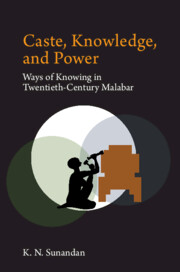Book contents
- Frontmatter
- Contents
- Acknowledgements
- Notes on Transliteration
- Introduction: Caste, Knowledge, and Power
- 1 An Ashari World of Knowing
- 2 An Ashari World of Ignoring
- 3 A Nampoothiri World of Acharam
- 4 Nampoothiris and the Order of Knowledge
- 5 Asharis and the Order of Knowledge
- Postscript: Towards an Artisanal Way of Practice of Knowing
- Bibliography
- Index
5 - Asharis and the Order of Knowledge
Published online by Cambridge University Press: 11 October 2022
- Frontmatter
- Contents
- Acknowledgements
- Notes on Transliteration
- Introduction: Caste, Knowledge, and Power
- 1 An Ashari World of Knowing
- 2 An Ashari World of Ignoring
- 3 A Nampoothiri World of Acharam
- 4 Nampoothiris and the Order of Knowledge
- 5 Asharis and the Order of Knowledge
- Postscript: Towards an Artisanal Way of Practice of Knowing
- Bibliography
- Index
Summary
By the last quarter of the twentieth century, Asharis started interacting with the order of knowledge, and this interaction transformed Ashari practices. In Chapter 2, we saw that throughout the first half of the twentieth century, Asharis avoided entering the order of knowledge by maintaining asharippani as a practice of knowing. In the context of India's formal independence from colonial domination in 1947 and the subsequent nationalist takeover of the institutions of production of knowledge, Asharis faced new forms of intervention in their world of knowing. Analysing the changing relation between jati and asharippani in the second half of the twentieth century, this chapter demonstrates that Asharis in this period entered an overlapping world of production of knowledge and practices of knowing. If in the period between 1950 and 1970, the processes of transformation in the Ashari world were slow and indistinct, in the last two decades of the century, by contrast, they gained momentum and attained concrete forms. This chapter analyses the new social forces that produced the transformations in the Ashari world in the second half of the twentieth century and the important elements of the transformed Ashari world.
Soon after the formal declaration of the independent Indian Republic in 1950, the Government of India began reorganizing regional states based on language. Keralam was formed on 1 November 1956, by merging the supposedly Malayalam-speaking regions of Malabar, Kochi, and Thiruvithamkoor. From this very moment, caste organizations had a central role in the democratic politics of the state. Even in the early twentieth century, caste-reform organizations had declared sharing and redistribution of resources among different caste communities as one of their main demands. Still, the reform leaders in that period equally focused on the internal reform of daily life practices and on the introduction of new forms of marriage and family. After independence, these organizations became involved in electoral political processes and became the mediators between the caste community and the government. J. Devika, in her analysis of the role that caste played in the development of the Kerala Model, argues that the savarna caste domination in this model was assured by the left through a political strategy of ‘secularized caste’.
- Type
- Chapter
- Information
- Caste, Knowledge, and PowerWays of Knowing in Twentieth Century Malabar, pp. 160 - 188Publisher: Cambridge University PressPrint publication year: 2023



